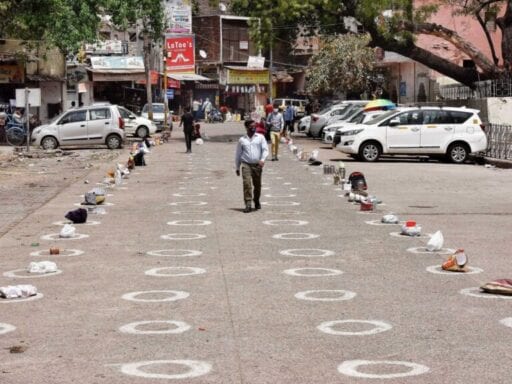The country opens up small retail stores in a bid to slowly restart its economy.
India’s nationwide coronavirus lockdown — the world’s largest, and one of its strictest — was eased slightly on Saturday when small neighborhood convenience stores were allowed to reopen.
The incremental step represents the government’s desire to slowly reopen some business sectors and provide relief for small, cash-strapped businesses as the economy reels from stay-at-home orders that have been in place since March.
India’s federal home ministry announced on Friday that small retail shops could reopen with half their staff, and with the expectation that people physically distance and wear masks and gloves. The stores sell things like food, drinks, and mobile phone cards.
The opening up of neighborhood stores has exceptions: it doesn’t apply to hundreds of quarantined towns and hotspots across the country. And even with the relaxation of rules for these shops, the sale of liquor and other nonessential items is banned, and shops in marketplaces like malls cannot be reopened.
The relaxation of the lockdown comes after India allowed manufacturing and farming to start back up again in rural areas last week, a move designed to give millions of poor wage-earners the ability to start making money again.
India’s lockdown was imposed on its 1.3 billion people with just four hours’ notice on March 24. It was initially expected to last for three weeks but has since been extended until May 3. Under the current stay-at-home rules, people are not to leave their homes unless they’re trying to obtain food, medicine, or other essentials.
India has reported nearly 25,000 cases of coronavirus and 780 deaths, and new teams are being set up to monitor compliance with lockdown rules. Experts say, however, that the government is not testing nearly aggressively enough to properly count cases or fatalities.
India has provided assistance to the poor as the economy has ground to a halt. The government says it has given out about 1,000 rupees ($14) each to more than 350 million people under a state program, and distributed food grains to more than 50 million people and cooking gas bottles to about 10 million people for free.
The relief measures were part of a broader $1.7 trillion rupee stimulus package ($22.5 billion) — but many economists say it hasn’t gone far enough.
India wants to reopen its economy soon. Critics say it’s not doing enough
A Reuters survey of economists predicted that India’s economy is likely to see its worst quarter since the mid-1990s.
“We don’t consider economic stimulus as strong enough to position the economy for a speedy recovery once the pandemic ends,” Prakash Sakpal, Asia economist at ING Bank, told Reuters.
Vinayak Banerjee, a Nobel Prize-winning economist at MIT, has criticized the government for not spending enough money to provide relief to the poor. Roughly 70 million people in India live in extreme poverty — living on under $2 a day.
“I know there’s a concern that what is the use of giving money to people when the markets are closed. But, to begin with, you can tell people that money is coming and create a mood for demand,” he told BBC. “People need reassurance. And the government has to be proactive in reassuring people.”
Banerjee pointed out that the pandemic has added to preexisting problems with consumer demand.
“The economy was already facing a demand slump. The [coronavirus] outbreak is a double whammy and many people have lost their earning capacity. There’s an additional demand slump now,” he said.
A crucial part of a country’s ability to reopen its economy is developing extremely robust testing capacities. Effective testing — especially when coupled with contact tracing — can allow governments to make quarantines more selective and responsive to hot spots.
But India has struggled with testing at the rate that’s appropriate for its enormous population size. As Vox’s Alex Ward has explained, India’s testing regime was shockingly underwhelming in the early stages of the pandemic. In the weeks after the first confirmed case of coronavirus in India, “government officials were only testing people who had traveled internationally or had come into contact with someone who tested positive,” Ward reported. “Because of that focus, India had one of the lowest testing rates in the world as of March 13.”
Moreover, those tests were “weak,” Jayaprakash Muliyil, one of India’s most renowned epidemiologists, said, because they tested for any strain of coronavirus, including SARS and MERS.
Ultimately, India is caught in the same economic dilemma as any other country that has chosen to use sweeping lockdowns to shield the public from the virus. But experts say that attempts to reopen it are going to be challenging.
“India is essentially debating between epidemiological gain versus economic pain,” Aurodeep Nandi, an economist at Nomura, told the Financial Times as manufacturing and agricultural work were starting to reopen. “While the aim is to nudge the economy from lockdown atrophy, the opening will ultimately be on a wing and a prayer that the number of cases does not escalate as India makes its way back to work.”
Support Vox’s explanatory journalism
Every day at Vox, we aim to answer your most important questions and provide you, and our audience around the world, with information that has the power to save lives. Our mission has never been more vital than it is in this moment: to empower you through understanding. Vox’s work is reaching more people than ever, but our distinctive brand of explanatory journalism takes resources — particularly during a pandemic and an economic downturn. Your financial contribution will not constitute a donation, but it will enable our staff to continue to offer free articles, videos, and podcasts at the quality and volume that this moment requires. Please consider making a contribution to Vox today.
Author: Zeeshan Aleem
Read More



